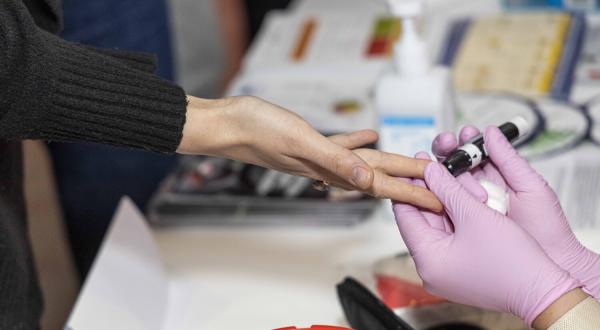EIT Health Hub in Latvia: A platform for emerging medical unicorns
In healthcare, the journey from an innovative idea to a finished product or service is a long one. Every product and service must be data-driven, patient-centric, and comply with regulations. Patient access is complex and data systems are often poorly organised. As a result, the demand for innovative solutions to ease the burden on the healthcare system is immense, and the potential benefits for both society and innovators are invaluable. The EIT Health Hub at Rīga Stradiņš University (RSU) in Latvia supports medical technology innovators in navigating this process, helping them implement their ideas by utilising resources available both in Latvia and across Europe.
Information and coordination umbrella
‘Our main role is to inform representatives of Latvian start-ups, students, and researchers about the opportunities available within the EIT Health network and beyond, to develop their ideas and to bring them together through training programmes and competitions. This helps them understand where to start, find mentors, and attract funding,’ explains Līga Žūka, Director of the RSU Innovation Centre and Head of the EIT Health Hub in Latvia. She also highlights the valuable support that is available, including funding at various stages of solution development, expert advice from Europe’s leading healthcare professionals, and the opportunity to test solutions in real-world settings such as hospitals and healthcare organisations.
EIT Health, the European Institute of Innovation and Technology in Health, is a broad and dynamic community of world-leading healthcare innovators supported by the European Union. It brings together the brightest minds from business, research, and education to address Europe’s most pressing healthcare challenges. The EIT Health RIS Hub in Latvia, operating under the auspices of RSU since 2019, serves as an intermediary between the broader EIT Health network and Latvian healthcare innovators. There are 11 such hubs across Europe.
Collaboration and networking: The lifeblood of the medical ecosystem
The EIT Health Hub is dedicated to strengthening Latvia’s healthcare innovation ecosystem through special events. One such event is the EIT Health i-Days hackathon for students, which fosters the creation of interdisciplinary teams and encourages the generation of innovative ideas by bringing together students from various universities, programmes, and study levels. Another key event is the EIT Health Healthcare Morning Talks, where members of the entire medical ecosystem are invited to participate and engage in discussions.
‘We invite representatives from public administrations, start-ups, established companies, and hospitals to join these discussion mornings. It provides a valuable opportunity to connect, identify challenges, and assess the viability of potential solutions. For example, at the recently concluded EIT Health Healthcare Morning Talk entitled ‘Open Innovation Journeys: Collaborative Pathways, Alliances and Networks’, experts discussed the sharing and secondary use of patient data—an area that remains relatively unregulated in Latvia,’ says Žūka. ‘Latvia is a small country, allowing us to connect with professionals from various fields through just a few phone calls, but we still face challenges in building interdisciplinary teams. Successful innovation requires networking, communication, discussion, and the ability to find like-minded individuals. In healthcare, more than any other sector, innovation must be interdisciplinary to create patient-centric products, ideas, solutions, and prototypes.’
The EIT Health Hub in Latvia, in collaboration with local organisations, organises various activities and events to foster the development of the Latvian healthcare innovation ecosystem. One such event is this year’s Riga 1st Hospital’s hackathon The Big Four, where participants were challenged to come up with ideas for the strategic development and optimal use of the hospital’s four buildings. ‘We find it fascinating how innovations designed for a specific institution can contribute to the development of the broader ecosystem. However, our focus is not just on Riga – our goal is to encourage comprehensive cooperation across all of Latvia,’ says the Head of the EIT Health Hub in Latvia. For instance, in the spring, the EIT Health Hub, in partnership with the Vidzeme Planning Region (VPR) and the Vidzeme University of Applied Sciences / European University (E³UDRES²), organised a workshop focused on health development projects, aimed at promoting the development and implementation of interdisciplinary research and innovation projects across the regions.
Another example of successful cooperation is the free online training Cilvēcīgi par tehnoloģijām (Humanly about Technology) organised by EIT Health, RSU and Riga TechGirls to promote the development of digital skills in the healthcare sector.
‘This collaboration is invaluable and serves as an excellent example of how we can support those already working in or aspiring to enter the healthcare sector. In the long term, it promotes interaction between professionals from various sectors, start-ups, and the creation of new innovations,’
reflects Žūka.
Latvia develops through each success story
Latvia ranks 42nd in the Global Innovation Index 2024, placing it lower than many other EU countries. This is why each enterprising innovator matters—those who contribute to the quality of public healthcare by realising their dreams and thus help position Latvia as an emerging innovation hub on the global map. Several companies are actively participating in EIT Health programmes at various stages of solution development and achieving remarkable success. For example, PrintyMed, an EIT Health graduate, has developed technology to produce artificial spider silk for medical applications, ranging from wound dressings to artificial organs. Additionally, Birgermind has created brain-reading technology that is already in use in Latvia, enabling paralysed patients to communicate with others.
‘We don’t help you write projects, develop products, find mentors, or secure funding, but instead, we act as consultants,
who provide a roadmap: which European programmes to apply for, who to contact, which hospitals to approach, and when to engage further with the RSU Innovation Centre. Ultimately, it is up to each start-up to create its own unique path,’ says Žūka.
Related news
 RSU Health Day attracts many first-time donors and large number of student research groupsFor RSU Employees, For Students
RSU Health Day attracts many first-time donors and large number of student research groupsFor RSU Employees, For Students


